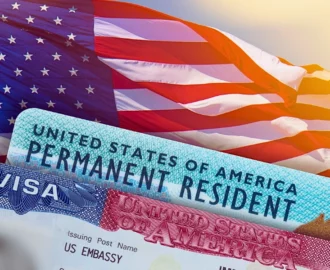Immigrants in Chicago, Illinois, often face challenges integrating into American society. 4 challenges that immigrants face include the language barrier, discrimination, accessing healthcare and social services, and obtaining employment. Fortunately, with the right help, overcoming these obstacles is possible.

What Are the Most Common Challenges Faced by Immigrants in Illinois?
There are over 1.8 million immigrants in Illinois. Unfortunately, many immigrants new to the country find it tough to acclimate. Here are some of the most common challenges you may face as an immigrant:
Language Barrier
The language barrier is one of the biggest challenges of immigrant adaptation to American culture.
Many immigrants in Illinois come from Latin America, where Spanish is the predominant language. Others come from Asia, Africa, the Middle East, and Europe.
Whether your native language is Spanish, Chinese, Vietnamese, Arabic, Hindi, Russian, or any other language, you might find it hard to acclimate to a country that predominantly speaks English.
English, in particular, has a lot of quirks that can be confusing to new speakers. Getting the pronunciation right is another challenge; incorrect pronunciation can lead to misunderstandings and even prejudice.
Whether it’s figuring out how to use the public transportation system, book a doctor’s appointment, or even buy something in the supermarket, the language barrier can complicate all aspects of everyday life. It can lead to feelings of isolation, social exclusion, and loneliness, which can have an impact on your mental health.
Discrimination and Prejudice
One of the biggest challenges that immigrants face when arriving in the United States is discrimination. There are people who, unfortunately, are biased and prejudiced towards immigrants. Discrimination and prejudice can manifest in various ways, including being excluded from employment opportunities.
Often, the discrimination can take the form of abuse and harassment. Verbal harassment from strangers is common, and even physical abuse is a possibility.
Sometimes, discrimination and prejudice is harder to spot, but it’s felt, nonetheless. For example, people may stare at people who emigrated from another country due to their skin tone, facial features, or accent.
At other times, they may treat them with suspicion for no reason. For example, an employee following or watching an immigrant in a shop to make sure they aren’t shoplifting, with no cause for suspicion other than their appearance, is a form of discrimination.
Employment and Economic Challenges
One of the challenges immigrants face is gaining employment. Many immigrants are forced to work “under the table,” which frequently leads to exploitation and poor working conditions. This typically involves working for menial jobs that are underpaid and don’t come with any benefits, such as overtime or health insurance.
However, you may be eligible to apply for a work permit, giving you authorization to work in the United States legally. For example, immigrants who apply for asylum can file for employment authorization after 150 days. If you already have a work permit, it’s critical to file for an extension (if not eligible for an automatic extension) to avoid working illegally once it expires.
Even if you possess the proper documents, some employers may discriminate against immigrants, despite laws to the contrary. Federal law prohibits discriminating against someone based on their ethnicity, national origin, citizenship, or immigration status, but that doesn’t mean it doesn’t happen.
Difficulties in gaining employment may lead to other economic challenges. Many immigrants send money to their relatives in their home countries, which means there is less money left over for them, forcing them to take on second jobs.
In turn, economic challenges may lead to housing problems. Many immigrants live with extended family in small houses to save on the rising costs of rent. Others live in poor housing conditions or are forced to seek refuge in homeless shelters.
Finding housing can be challenging due to other reasons. Some landlords may discriminate against immigrants. Others may require large deposits, such as two months’ rent upfront, or require documentation (such as a credit report check) that you might not have.
Access to Healthcare and Social Services
Immigrants may also face challenges in accessing healthcare. Health insurance, while available, can be expensive for immigrants who are trying to establish themselves and gain a solid financial footing.
In addition, the application process is often confusing, especially if a language barrier is involved. Many immigrants are unaware of the various health insurance options available to them, or don’t know where to start.
The same applies to other social services and federal programs designed to help those facing tough economic conditions. For example, the Supplemental Food Program for Women, Infants & Children (WIC) is a federal program that provides food benefits in the form of a card that can be redeemed for food items such as milk and eggs. While WIC does not check an applicant’s immigration status, many immigrants are unaware of how to access these benefits.
The Immigration Process in Illinois
It’s important to understand the immigration process in Illinois, including your immigration status and rights under federal law. It will help you better access services that can assist you in acclimating to your new home.
Types of Visas
There are two main categories of US visas for immigrants in Illinois: immigrant and non-immigrant visas. Immigrant visas are designed for immigrants who intend to live in the United States on a permanent basis. Non-immigrant visas, on the other hand, are designed for individuals who wish to visit, work, or stay in the United States on a temporary basis.
Each type of visa has multiple categories, depending on the purpose of your visit. A student visa allows you to study, for example, but it only allows you to work 20 hours per week while school is in session.
A green card is issued after arrival in the United States to eligible individuals on an immigrant visa. It grants permanent residence rights, and after several years, green card holders can pursue citizenship.
If you need help understanding the type of visa you are on and the rights it offers, or if you need help getting a visa for a family member, contact an immigration attorney.
Affording Legal Representation
Many attorneys offer free case evaluations. Whether you are trying to sponsor a spouse for a visa or green card or facing another immigration issue, such as deportation, a free case evaluation can help you determine affordability and payment options available to you.
Fear of Deportation Can Impact the Quality of Life
Many immigrants live in fear of deportation, whether warranted or not. Facing the threat of deportation after years of building a life in America can be terrifying. Fortunately, there are avenues available to fight a deportation order.
How an Immigration Attorney Can Help You
The methods for fighting a deportation or removal notice depends on your case. If you have been living in the country for more than 10 years, can show good moral character, and can demonstrate that the removal will cause exceptional and unusual hardship to a citizen, you can file for a cancellation of removal.
Regardless of your situation, you have a right to argue your case in court. There are various types of deportation hearings, and an immigration legal services attorney can help you navigate the process and provide representation.
Depending on your case, you may be able to file for asylum status. You may also be eligible for programs such as DACA (Deferred Action for Childhood Arrivals) or DAPA (Deferred Action for Parental Accountability), which can offer you certain protections and prevent the threat of deportation.
Questions to Ask an Attorney at a Consultation
One of the first things you should ask your attorney is how frequently he or she deals with your case. Immigration law is a broad practice, as it can involve work permit applications, green card sponsorship, representation in removal hearings, family processes, filings for asylum or refugee status, and more.
Some cases are specific. For example, if you are transgender, ask your attorney how he or she can guarantee your rights as a transgender immigrant. Transgender immigrants have the same rights as other immigrants, and they may also be able to seek asylum if they would be persecuted in their home countries.
You should ask your attorney how often you will be in contact with him or her, the strategies he or she will use to win your case, and how much it will cost you. Ask him or her what your chances of success are so you get a realistic picture of what to expect.
Most importantly, be as specific and detailed as possible about your case, so the attorney can get an accurate picture of the challenges you face. Don’t hesitate to hold anything back.




